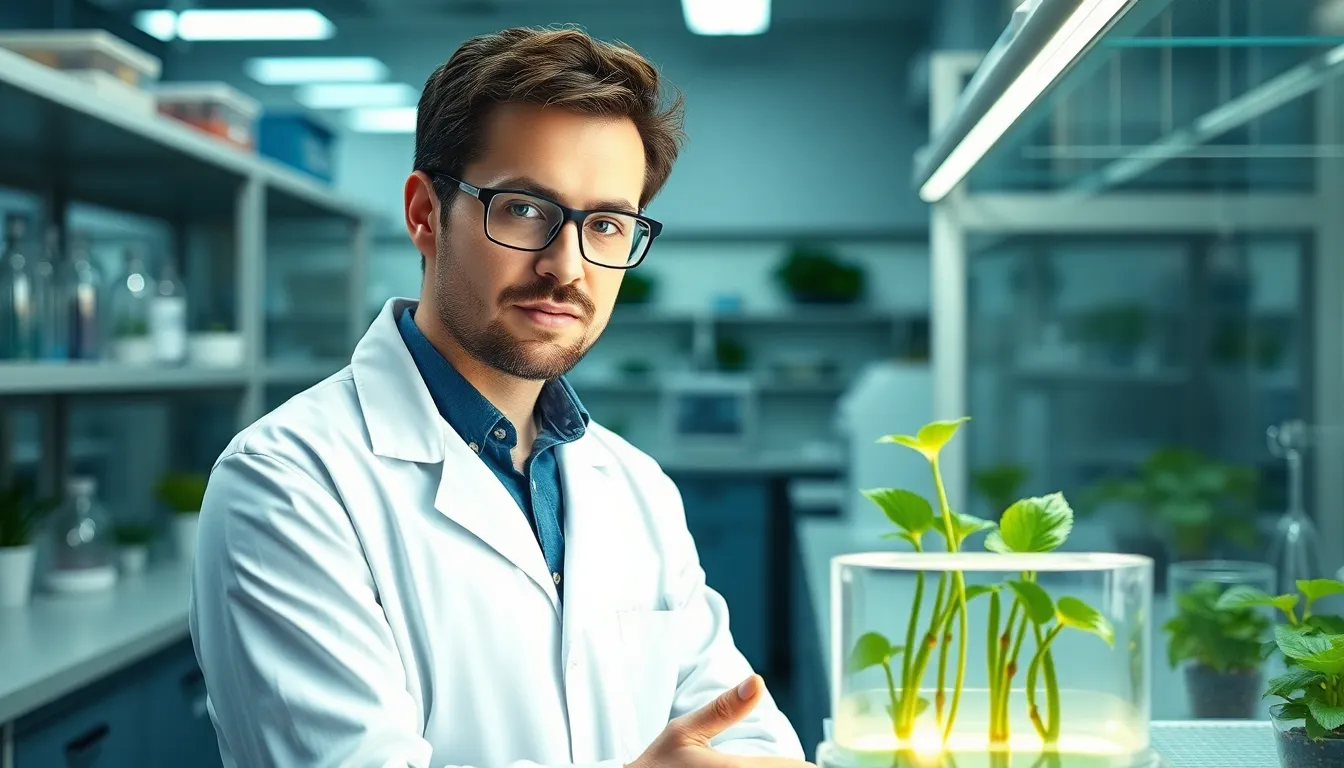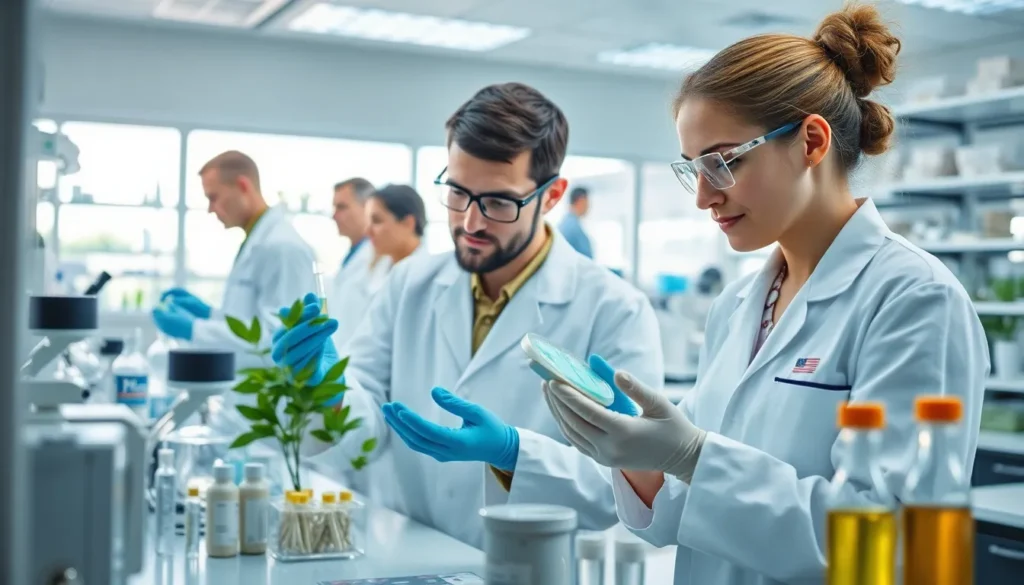Table of Contents
ToggleBiotechnology is the unsung hero of modern life, quietly revolutionizing everything from healthcare to agriculture. Imagine a world where crops resist pests and diseases, or where life-saving drugs are tailored just for you. Sounds like science fiction? It’s actually the reality we’re living in today, thanks to the wonders of biotechnology.
Overview of Biotechnology in Life
Biotechnology plays a crucial role in everyday life, influencing healthcare, agriculture, and environmental management. In healthcare, genetic engineering leads to targeted therapies and vaccines that save lives. Innovations in gene editing, such as CRISPR, empower scientists to modify DNA, offering new treatments for genetic disorders.
Agriculture benefits significantly from biotechnological advancements. Crop varieties now feature traits like drought resistance and enhanced nutritional value. These modifications contribute to food security, particularly in regions with harsh climates. Farmers increasingly adopt biotechnology to protect crops from pests, reducing the reliance on chemical pesticides.
Environmental applications are also noteworthy. Bioremediation utilizes microorganisms to clean up contaminated sites, reducing hazardous waste and improving ecosystem health. Wastewater treatment processes incorporate biotechnology to efficiently recycle resources, contributing to sustainable practices.
Industry sectors are not left behind. Biopharmaceutical companies leverage biotechnology to produce biologics, providing effective alternatives to conventional medications. Production techniques, such as fermentation, enable the creation of biofuels and biodegradable materials, promoting a greener economy.
Educational institutions emphasize biotechnology, preparing future generations for careers in this rapidly evolving field. Students engage in research programs that explore novel applications, fostering innovation and discovery.
Each aspect highlights the transformative power of biotechnology in shaping a sustainable future. Integral to health, agriculture, and environmental sustainability, biotechnology serves as a backbone for advancements that improve quality of life.
Applications of Biotechnology

Biotechnology has diverse applications, particularly in agriculture and healthcare. These fields have seen transformations that enhance productivity and improve human health.
Agriculture
Agricultural biotechnology increases crop yields through genetic modification. Scientists develop pest-resistant and herbicide-tolerant plants, minimizing the need for chemical pesticides. Genetic engineering also enables the creation of crops with enhanced nutritional profiles, such as Golden Rice enriched with vitamin A. Additionally, biotechnology aids in developing drought-resistant varieties that thrive in arid conditions. These advancements serve crucial roles in ensuring food security, especially in regions facing climate challenges.
Healthcare
Healthcare advancements benefit significantly from biotechnology through personalized medicine and novel treatments. Genetic therapies target specific diseases by altering genes or using engineered therapies, like CAR-T cell therapy for certain cancers. Vaccines, produced using biotechnological techniques, offer rapid responses to emerging pathogens, exemplified by mRNA vaccines for COVID-19. Moreover, biopharmaceuticals, such as monoclonal antibodies, effectively treat various medical conditions. This innovative approach not only saves lives but also improves overall healthcare outcomes, showcasing biotechnology’s vital contribution to modern medicine.
Impact on Environment
Biotechnology significantly influences environmental sustainability through innovative practices. Its applications enhance ecosystem balance and contribute to cleaner surroundings.
Bioremediation
Bioremediation utilizes microorganisms to degrade environmental pollutants. These beneficial microbes break down hazardous substances, such as oil spills and heavy metals, effectively restoring contaminated sites. Field studies show that this method can reduce pollution levels by up to 95% in certain conditions. By employing bioremediation techniques, industries can minimize environmental damage while promoting sustainable land use. Companies increasingly rely on biotechnological solutions for waste treatment, demonstrating a commitment to protecting natural resources.
Conservation
Conservation efforts benefit from biotechnological advancements aimed at preserving biodiversity. Techniques like DNA barcoding help identify endangered species, guiding conservation strategies and ensuring genetic diversity. Genetic engineering enables the development of disease-resistant plant and animal species, bolstering populations at risk of extinction. Research shows that these methods can enhance ecosystem resilience amidst climate change. Organizations worldwide adopt biotechnological approaches to support wildlife conservation and habitat restoration, leading to healthier ecosystems.
Ethical Considerations
Ethical considerations in biotechnology are essential and multifaceted. Concerns surrounding genetic modification raise questions about the long-term effects on human health and the environment. Environmental impacts often emerge, highlighting the need for careful assessment of biotechnological advances before widespread implementation.
In healthcare, the use of CRISPR for gene editing sparks debates about consent, especially in editing human embryos. Ethical dilemmas arise when determining who benefits from biotechnological innovations, creating potential disparities in access to treatments. Moreover, issues related to privacy and the storage of genetic data contribute to ongoing discussions about ethical governance in biotechnology.
Agricultural biotechnology includes genetic modifications that may impact biodiversity. When cultivating genetically modified organisms, the potential for gene transfer between species needs consideration. Farmers may face challenges integrating modified crops with conventional farming practices, complicating their choices.
Environmental remediation technologies also raise ethical questions about intervention in natural ecosystems. Utilizing microorganisms for bioremediation requires evaluating unintended consequences on soil and water quality. Balancing technological advances with ecological integrity represents an ongoing challenge for researchers and policymakers.
Conservation efforts involving biotechnology introduce complexities regarding species manipulation. Preservation of genetic diversity can conflict with ambitions to enhance specific traits within endangered populations. Striking a balance between innovation and ethical responsibility proves crucial as biotechnology continues to evolve.
Addressing these ethical considerations effectively requires collaboration among scientists, ethicists, and policy-makers. Engaging the public in discussions about these issues fosters a better understanding of the implications of biotechnology in life.
Future Trends in Biotechnology
Emerging technologies in biotechnology suggest significant advancements shaping healthcare and agriculture. Precision medicine will gain traction as more individuals receive tailored treatments based on their genetic makeup. These personalized therapies promise to enhance patient outcomes and improve health management.
Synthetic biology is another area poised for growth, allowing for the engineering of organisms to produce valuable compounds. The production of biofuels and pharmaceuticals through engineered microbes illustrates this potential. Moreover, CRISPR technology continues to evolve, enabling more precise gene editing techniques for treating genetic disorders.
In agriculture, vertical farming and biotechnology combine to enhance food production efficiency. Innovations such as gene editing will create crop varieties optimized for nutrient content and resilience to climate change factors. Enhanced crop yields through genetic modifications will play a pivotal role in addressing global food insecurity.
The field of bioremediation is likely to expand as industries seek sustainable solutions to environmental pollution. Harnessing microorganisms to restore contaminated sites can lead to significant reductions in pollutants. Techniques in environmental biotechnology will support cleaner production methods and waste management systems.
Ethical frameworks will also evolve alongside these advancements. Collaboration among scientists, ethicists, and policymakers will help navigate the complexities of genetic modifications. Discussions surrounding the equitable access to biotechnology innovations will promote broader societal benefits and address disparities.
As innovations unfold, biotechnology’s role in shaping the future of health, agriculture, and the environment will become increasingly evident. These trends highlight a trajectory towards enhanced efficiency, sustainability, and ethical considerations in biotechnological advancements.
Biotechnology is transforming everyday life in profound ways. Its influence spans healthcare advancements with life-saving treatments and vaccines to agricultural innovations that ensure food security. Environmental sustainability also benefits from biotechnological practices that restore ecosystems and reduce pollution.
As these innovations continue to evolve, the importance of ethical considerations cannot be overlooked. Addressing concerns about genetic modification and access will be crucial in shaping a future where biotechnology serves all of humanity. With ongoing collaboration among scientists, ethicists, and policymakers, the path forward promises a balance between progress and responsibility. The unfolding journey of biotechnology holds the potential to redefine health, agriculture, and environmental stewardship for generations to come.







